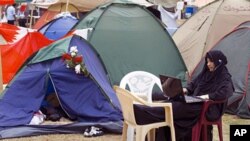A global media watchdog group has released its “Enemies of the Internet” list for 2012, citing countries that inhibit freedom of expression on, or access to, the Internet.
In the report released Monday, Reporters Without Borders said the Arab Spring is changing the face of Internet freedom, noting countries like Bahrain that have successfully caused an information blackout with "an impressive arsenal of repressive measures" in order to curtail protest. The report said the Arab Spring also has led to the opening up of some governments, like Libya.
|
RWB's 2012 Enemies of the Internet |
|
Reporters Without Borders credited the Internet and social networks like Twitter for the successes of the Arab Spring, the cascade of revolts across the Arab world.
The annual report also draws up a list of countries "under surveillance," for censoring certain online content or punishing users for illegal downloads. Countries on that list include Australia, France, India, Egypt and South Korea.
The report also says cyberattacks in the form of "distributed denials of service" are widespread - including in Russia, where it says a series of such attacks on the eve of the December parliamentary elections took place with the aim of stifling political discussion. In Belarus, the report says web users trying to connect to a social networking site were redirected to sites containing malicious software.
Reporters Without Borders says Pakistan is seeking to create a national Internet filtering system, which could land it on the "enemies" list next year.
|
Recently, the state-run Pakistani Telecommunications Authority published a request for proposals to companies worldwide for what it called the “deployment and operation of a national level URL Filtering and Blocking System”. That would establish in a similar fashion to China's Golden Shield, or "Great Firewall of China". That proposal has drawn in attention of free speech groups, including the San Francisco based Committee to Protect Journalists. VOA’s Ira Mellman spoke with Danny O’Brien, CPJ’s Internet Advocacy Coordinator. |
Some information for this report was provided by AP.
| Join the conversation on our social journalism site - Middle East Voices. Follow our Middle East reports on Twitter and discuss them on our Facebook page. |




